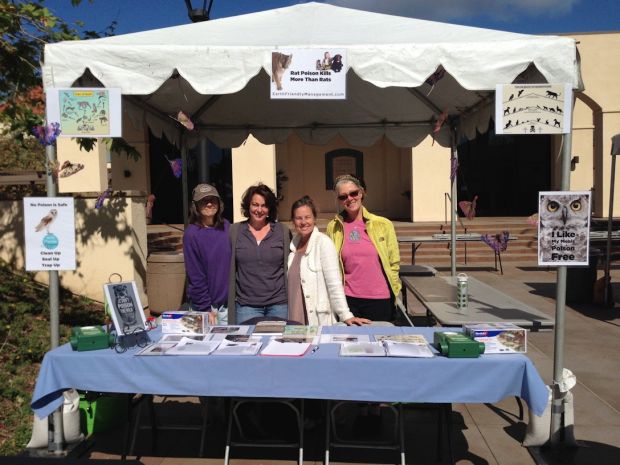
For more than a year, Poison-Free Malibu (PFM), a Malibu-based nonprofit, has quietly been leading the charge to eliminate anticoagulant rodenticides from local stores and homes.
The rodenticides, which often come in the form of black “bait boxes,” are meant to kill rats and other rodents considered to be pests. However, they are now known to spread poison up the food chain to harm larger mammals.
National Park Service (NPS) studies have shown that rats who ingest the harmful chemicals can take several days to succumb to the poison, and often in the interim larger birds and mammals hunt and eat them.
“They’re wandering around with poison in [their] system, which can make them more of a target for prey animals,” NPS spokesperson Kate Kuykendall said, “so the prey animals could be more likely to eat them and then get the poison in their system.”
Kian Schulman, a founder of PFM, agreed.
“It’s called the ‘chain of death,’” said Schulman, “animals don’t stay in [the bait boxes] and die, they actually exit the boxes and start the chain of death.”
Poison-Free Malibu formed in early 2013 and includes five members, all Malibu residents. Recently, according to member Wendi Werner, they achieved official 501(c)3 nonprofit status.
In 2013, PFM worked with the city to pass a resolution urging “businesses in Malibu to no longer use or sell anticoagulant rodenticides,” along with urging “all property owners to cease purchasing or using anticoagulant rodenticides.” At that time, the City of Malibu also pledged to no longer use anticoagulant rodenticides.
In addition to help from the City and grassroots footwork inside Malibu, PFM has also made an impact on rodenticide use all across the Santa Monica Mountains region, inspiring groups in Agoura Hills, Calabasas, Moorpark, Ojai, Westlake Village and Whittier to work to eliminate the poisons in their communities.
According to experts with NPS, a lack of understanding has made halting the use of rodenticides more difficult.
“Most of the people who are using these anticoagulant rodenticides are not aware that the poison works its way up the food chain and is impacting the wildlife,” said Kuykendall.
PFM members added that the more community education there is, the more people cut out rodenticides.
“After we educate the public, their main reaction is, ‘I want to have nothing to do with these poisons,’” said Schulman.
Bob Stallings, City of Malibu Parks and Recreation Director, has been working with the group since 2013 to spread awareness over the dangers of anticoagulant rodenticides.
“[We] put together an education program and reach out to these shopping centers and owners and say we’ve got some ideas we’d like to share with you [to] improve the overall health and safety of the animals in our community,” said Stallings.
The outreach project has so far been a success, according to accounts on PFM’s website.
The site lists local businesses that have pledged not to use these pesticides: Nobu, Vintage Grocers, Nikita, V’s and Starbucks, as well as Pepperdine University.
“There’s really not that big a need for [anti]coagulants — start with a broom and a mop,” said Vintage Grocers general manager Eric Fuchser.
“It’s a horrific death and no animal should have to go through that,” added Fuchser, who said that his own dog was a victim of rodenticides and died after eating a poisoned rodent. “I know pests are pests, but I think there are other ways of dealing with them and poison is just a lazy way out.”
Pepperdine confirmed that it no longer uses rodenticides, following PFM outreach this past Earth Day, in April 2014.
Wendi Werner, another founding member of PFM, described the alternative pest-control method encouraged by PFM and the City of Malibu.
“Our motto is ‘clean up, seal up, trap up,’ to protect the animals in the Santa Monica Mountains,” said Werner.
What this essentially means is, store- and homeowners can avoid the need for bait boxes if they make sure to keep their property clean and dry, making it much less tempting to pests.
According to Werner, the businesses that have complied with PFM’s request for poison removal have not complained of rodent issues.
“They keep everything sparkling clean, so it’s great, they don’t need to use a bait box,” Werner said.
